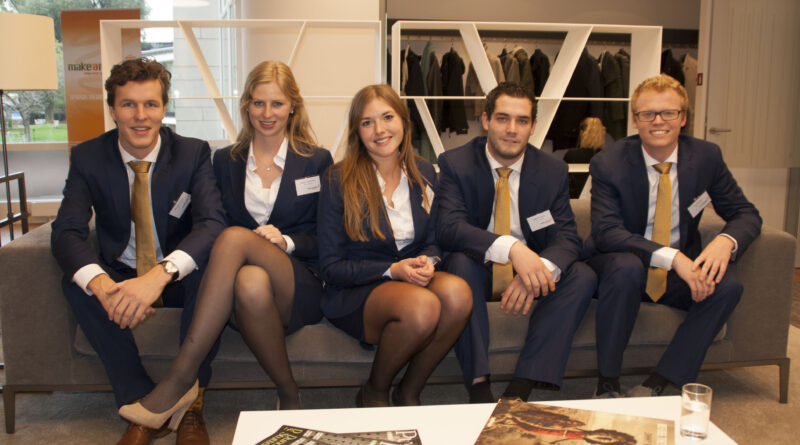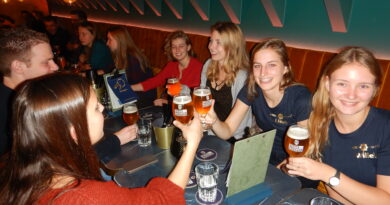EBT Interview
Two weeks, 45 companies and 915 participating students. This can only mean one thing: the Economic Business weeks in Tilburg! But who are the people behind the biggest career event of our city? For this special we have taken a closer look at the board of the EBT by interviewing two of their members: Chairman Jelle van ‘t Ooster and Treasurer & Operations Manager Nikki Suijkerbuijk.
Can you explain in further detail what the Economic Business weeks are about?
Jelle: The EBT consists of numerous activities, ranging from personal development days to speed dates with companies. Every student from the Tilburg School of Economics and Management is allowed to participate, but also students from other faculties are allowed, as well as students from other universities.
Nikki: The EBT is interesting for students from all years of the BSc and MSc tracks, but usually first-year students do not apply. For those who are nearing the end of their studies, the Economic Business weeks are a great opportunity to meet firms and recruiters, for example by visiting company presentations, workshops, business lunches and individual conversations. However, we also focus on personal development. For instance, we have arranged CV checks, an assessment day and interactive training programs concerning developing alternative knowledge and skills.
Our study association Asset | Econometrics on the other hand also offers interesting career events, such as the Asset In-House Days and the LED. What does the EBT offer Econometrics students that the other events do not?
Jelle: We have noticed that the amount of participating students from Econometrics or Information Management is relatively low, which we find rather regrettable. This has to do with the well-known fact that EOR students have a high job-certainty, which often makes them less interested in developing themselves on a different level. However, we do highly recommend participation, as it offers new insights in the professional world.
Nikki: As a matter of fact, almost all participating companies have shown an interest in econometricians. This seems obvious for firms such as Anago, Accenture or Gupta Strategists, but also corporations such as Ahold, Nike and Philips seek interested Econometrics students. Besides that, the personal development days are very useful, as EOR students do tend to live in some sort of bubble. Both the BSc and MSc focus almost solely on analytical and quantitative skills, which is obviously what makes companies so very interested in the students, but this sometimes interferes with other highly valued competences. Being able to sell yourself, giving understandable presentations and clear communication are important factors on which we also focus during the EBT.
Sounds interesting! Organizing such an event sounds intensive though. How many people are actually working on this event?
Nikki: Our board consists of five people: Jelle (Chairman), Léanne (Vice-Chairman & Secretary), Nikki (Treasurer & Operations Manager), Marthijn (External Affairs) and Tuur (Public Relations). Of these, Tuur is the only one who started part-time, the rest of us work full-time during the entire year.
Jelle: Yes, but Tuur is currently working more than full-time weeks, as he is chief of promotion and we find promotion a very important factor. It is almost impossible for students to have missed our flyers, photo booth and snacks.
Nikki: Do not forget to mention the stilt walkers or our famous ‘poffertjes-stand’!
Why did the two of you choose to do a board year? And why did you choose to do this for the EBT and not, for instance, for an Asset department?
Jelle: When I came back to Tilburg after going on an exchange, I realized that I did not want to start my MSc right after finishing my Bachelor and so I started searching for other options. I had been an active member of Asset for quite some time, but I also already had quite some experience with the EBT. When the idea formed that I wanted to do a board year, I took both Asset and the EBT in consideration. In the end, I chose for the EBT as that meant working together with your team towards a climax. We do not work with committees, which you can either consider a positive or a negative thing, but that does give you more time to really accomplish your set goals.
Are you still content with your choice?
Jelle: Oh yes, very much! Over the past few months, we have achieved an incredible amount of things. Did you know that this year we have more participating companies and students than the last couple of years?
Congratulations! So what about you, Nikki? Why did you choose to do a board year?
Nikki: My story is somewhat the same as Jelle’s. I think it is very valuable to do something extra besides your studies, such that you also gain real-life experience and broaden your world. I have learned so many things this year, which I would not have learned from my regular courses. I now know how to negotiate with firms, I have been in contact with almost all recruiters, and I have found out exactly what my position within a team is.
Jelle: As it happens, none of our board members knew any of the others before we started this summer. Therefore, communication is key. Luckily we get along really well and we spent not only our days together, but also our evenings (voluntarily!). However, we can also be critical towards one another and have thorough discussions. Then again, voicing your opinion is a very valuable thing to learn.
Nikki: You also learn the opposite! For instance, when all your fellow board members do not agree with you, you have to be able to let it go and move on.
What more have you learned the past few months?
Jelle: For me, the most important thing I have learned is how to be a responsible leader. As chairman, I am the only EBT board member who does not have a specific task, but that does not mean that I have less obligations. It is my job to direct our team, to make them enthusiastic and to keep them on track.
Nikki: My biggest personal gain comes from my expanded social network. As Treasurer and Operations Manager, I am often in contact with companies, students and business partners. I know what qualities recruiters look for in students, how to create the perfect CV and how to present myself to potential employees.
Were there also disadvantages you encountered?
Jelle & Nikki: Uhm …. (Silence)
Nikki: I really hated getting up so early during the promotion period. Jelle, can you think of any other downsides?
Jelle: The possible disadvantage of doing a board year at the EBT is that you work in a somewhat closed environment. As already mentioned, we do not have any active members, nor are we a department of Asset. Therefore it is really important that you take time to get to know other boards and students, for instance by going to drinks and activities.
Nikki: In my opinion, we succeeded rather well! Even though we are not a part of Asset officially, I do feel like the Esplanade building, and especially our room E1.22, is where we belong.
Thank you very much for the refreshing interview. We wish you the best of luck for the upcoming EBT!
Unfortunately, it is no longer possible to subscribe for the activities of the EBT 2015. However, for those of you interested in organizing the EBT next year, applications for a board year are open until May 1. The current board would very much like to invite you for a talk about a board year over a cup of coffee!
Text by: Ennia Suijkerbuijk






